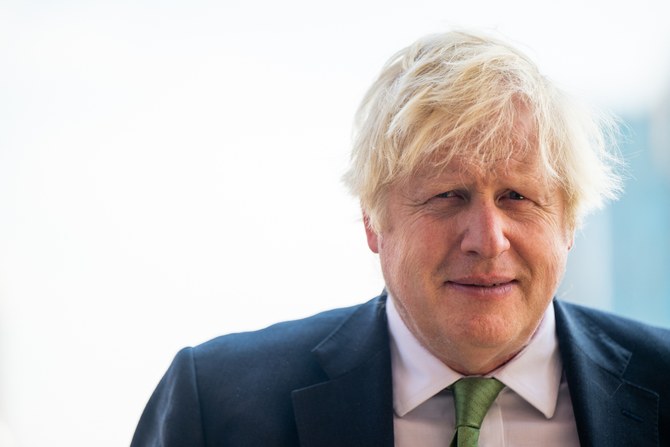Mohamed Chebaro
UK ex-Prime Minister Boris Johnson has angrily resigned as an MP, claiming that he had been forced out in a ploy by his political opponents. He has apparently decided to jump ship and resign before being sanctioned by the special parliamentary committee that was investigating whether the 58-year-old populist repeatedly lied to Parliament after he broke COVID-19 lockdown rules while he was in office – a saga referred to in the UK as “Partygate.”
Johnson’s resignation will likely be seen as a form of revenge on PM Rishi Sunak and an attempt to disrupt his premiership. Sunak has inherited a Conservative Party that is well down in the polls to the main opposition Labour Party after 13 years in power, and with a general election looming next year. But above all his resignation raises the question of whether Britain has finally seen the back of this colorful and divisive politician.
The months-long investigation by the Privileges Committee, which has a majority of MPs from Johnson’s own Conservative Party, goes to show that the parliamentary system is still able to weed out unruly leaders who try to act as if they are above the law. Even Johnson’s popularity – along with his 80-seat majority in the December 2019 general election on the promise to “get Brexit done” and later his ability to push through his less-than-perfect UK-EU divorce deal – did not help his case when it came to breaking the rules of conduct for elected politicians in Britain.
By quitting, Johnson avoids the consequences of a humiliating fight to remain an MP. But he did not quit without denouncing the committee, calling it a “kangaroo court,” which his supporters also did when the committee invited him to testify. During his testimony in March, he plainly said that he would judge the committee on its findings; in other words, if it refrained from sanctioning him, then he would respect the ruling, but if the reputable committee elected to recommend that he was sanctioned by Parliament, then he would “think that would be not only unfair, but I think it would be wrong.” In his resignation statement, Johnson, as expected, alluded – like any populist leader and bad loser – to his “bewilderment” and said that he felt appalled that he could be forced out in an antidemocratic way due to the Privileges Committee’s “bias.” While the committee’s report is yet to be published, he elected to jump before he was pushed as, to his mind, the committee’s purpose was to find him guilty regardless of the facts.
The controversial UK leader’s rise and fall, however, should be seen as a vote of confidence in parliamentary democracy. UK MPs, who are elected by the people as their representatives, usually have the final say on taming errant politicians, including those who, like Johnson, have tried to circumvent and undermine parliamentary rules and practices and tried to apply a presidential style of government. Responding to Johnson’s resignation, a Privileges Committee spokesperson said he had “impugned the integrity of the House by his statement.” The world will have watched with amazement the chapters of setbacks and scandals that plagued British politics on Johnson’s watch. But his luck continues to fade, as the COVID-19-era party scandals forced him to quit as an MP less than a year after 60 members of his own government, including Sunak, resigned and forced him out of office as prime minister.
However, rumors have persisted that Johnson, a thrice-married father of at least eight children, has not given up hope of returning for another shot at the top job. His rise to power was a conventional one, as he attended the elitist Eton College and Oxford University. His “cavalier attitude” was noted early on by a teacher. And later his apparent belief that rules were for other people, in addition to his elastic relationship with the truth, were forged when he was president of the Oxford Union, a debating society founded on rhetoric and repartee rather than mastery of cold, hard facts. After university, he was sacked from The Times newspaper after making up a quote, before he joined The Daily Telegraph as its Brussels correspondent, from where he became popular among Conservative euroskeptics for feeding them “euromyths,” such as EU plans for a federal mega-state that threatened British sovereignty.
He became an MP in 2001 and, three years later, was sacked from the shadow Cabinet by Tory leader Michael Howard for lying about an extramarital affair. From 2008 to 2016, he served two terms as mayor of London, promoting himself as a pro-EU liberal, a stance which he abandoned to become the “Leave” campaign’s figurehead for the 2016 Brexit referendum, capitalizing on his popular image as an unconventional but likeable rogue. Unlike former US President Donald Trump, who has blamed all his legal troubles on a conspiracy by his Democratic and liberal opponents, Johnson is blaming his demise on a “witch hunt” conducted against him by sections of his own party and Parliament. But it is not difficult for many to see how he has conspired against himself in his pursuit of his agenda of fame and gratification, breaking every rule of decency and public service on the way. Finally, his former colleagues in Parliament have managed to put a stop to his excesses and the damage he has caused to British public life and its reputation around the world.







